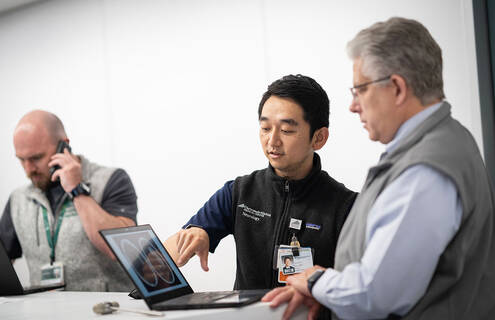
Dartmouth Hitchcock Medical Center's (DHMC) stroke team provides expert care for patients throughout northern New England. In addition to caring for acute stroke, the team offers unique neurology services dedicated to supporting community hospitals, preventing recurrent strokes, and advancing the field of stroke care.
Supporting community hospitals through
tele-neurology
Through its Tele-Neurology service, the DHMC neurology team assists emergency physicians at 15 community hospitals throughout northern New England in the diagnosis and treatment of all types of acute neurological conditions, including stroke, seizures, facial palsy, dizziness and more.
"Many hospitals in our rural area do not have general neurology providers, and there is a shortage of EMS providers to transport patients with stroke or other neurological conditions to large regional medical centers where emergency neurology care is available," said Timothy G. Lukovits, MD, medical director of the Cerebrovascular Disease and Stroke Program at DHMC. "Tele-stroke programs have been around for years, but through our Tele-Neurology program, we're doing more than just caring for patients with strokes — we're filling a gap in neurological care at local hospitals by consulting on patients that present to the Emergency Department with any neurological condition and connecting them to our in-person neurology clinic for follow-up."
A multidisciplinary approach to stroke prevention
In addition to providing acute care for stroke and other neurological conditions, DHMC experts take a multidisciplinary approach to stroke prevention for patients with conditions such as atrial fibrillation, patent foramen ovale, carotid artery stenosis, cerebral aneurysms and arteriovenous malformations.
"Our neurologists work collaboratively with cardiologists, vascular surgeons, neurosurgeons and neuroradiologists to match the right patient with the most appropriate treatment at the right time," said Dr. Lukovits. "We have weekly cerebrovascular and monthly vascular surgery and cardiology conferences where we discuss appropriate interventions for each patient, allowing them to receive consensus-based recommendations from a team of medical specialists."
Patients who require treatment have access to some of the latest catheter-based interventions to prevent stroke, including left-atrial appendage closure, PFO closure, transcarotid artery revascularization (TCAR) and aneurysm coiling.
Advancing stroke care through clinical research
DHMC is participating in innovative clinical trials that promise to pave the way for a greater understanding of which stroke treatments are most effective for specific patients, risk profiles, and stroke types. Clinical trials include:
- Neuro-AFib study, looking at patients who have atrial fibrillation and either an ischemic stroke or hemorrhagic stroke, who also may have cerebral amyloid angiopathy - a condition that predisposes people to dementia and hemorrhagic strokes.
- OCEANIC-STROKE study, testing whether an investigational anti-coagulant asundexian is effective in preventing future strokes without causing excessive bleeding.
- Zeit Alert for Stroke at Home (ZASH) Protocol, looking at whether an EEG headband worn at home can detect recurrent stroke in select high-risk patients.
Additionally, DHMC has been selected to participate in the StrokeNet research network.
"Our StrokeNet network participation will allow our team to more efficiently set up studies and open up more opportunities for NIH-funded research," said Dr. Lukovits. "Further, our participation will improve geographic diversity in clinical trials and expand access to promising treatments for rural patients."